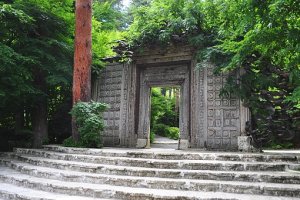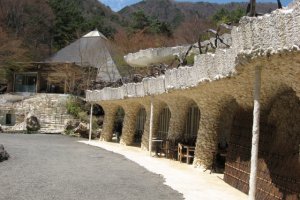The Kubota Itchiku museum is actually an artist’s paradise. It was built by the artist Kubota Itchiku (1917-2003) himself and showcases his priceless creations. Kubota Itchiku was a textile artist who dedicated his whole life to reviving and mastering the lost art of Tsujigahana (tsu-jee-ga-ha-na) silk dyeing, a traditional dye technique, used to decorate elaborate Kimono during 1333-1573. And let me tell you, we were not aware of this museum, the artist or the art until after we had visited this museum at Kawaguchiko.
Strolling around the quaint serene roads of Kawaguchiko, had it not been for a chance reference to the map in our hands, we would have had almost missed this museum. It actually is located atop a small winding detour uphill and away from the main road. Even on reaching the museum, it took us a while to realize that we were at the right spot, because we had seen nothing like it before. The very entrance of the museum stands out and is very unusual. It was like staring at some ruins amidst the dense woods. We gingerly stepped in and folllowed the walking trail that unfolded into beautifully landscapes with ponds, waterfalls, wooden benches etc.It was like entering a magic door into Alice’s another wonderland. The trail led us upto the main building. We were instantly awestruck by the unique architecture made of Okinawan corals and limestone. The main entrance was on the right guarded by a white horse of stone while there was a huge open garden space on the left flanked with columns of big pillars on the right and a stone staircase leading upstairs in the distance.
On entering inside and buying the tickets, we were then guided through several art exhibits from Asia and Africa, mostly comprising of the artist’s beads collections. Further we were led to the main gallery upstairs and were first shown an exclusive video of the artist’s creative life, highlighting his fascination and dedication for the art of Tsujigahana. The video depicted his first encounter with an old silk textile remnant of Tsujigahana at the Tokyo National Museum when he was just 20yrs old and how the beauty of the art kept haunting him. With no written instructions behind the same, how he had developed his own version of it called "Itchiku Tsujigahana," by replacing the originally used and obsolete fabric nerinuki by contemporary silk crepe fabric (chirimen) and synthetic dyes for natural colors. The video also showed the artist at work, meticulously tying innumerable knots, dipping them in myriad colours, pressing the dyed fabric and creating a totally unique masterpiece in each of his Kimonos. And while watching this video, it instantly struck a chord with us as we could relate it with the tie and dye technique Bandhani, widely used back home in India, especially in the states of Rajasthan and Gujurat.
After the video, we were led into the main gallery of his Kimono creations. There was a pyramid shaped wooden platform at the centre, housing and flanked all around by displays of huge exquisite Kimonos. It was just sheer magic! The story had come alive in each piece of his art. Huge fabrics of multiple colors perfectly blended to depict a unique theme. May it be the different seasons, lush landscapes or even a larger panorama of many Kimonos juxtaposed together like his unfinished work ‘The Symphony of Light’, the vibrant colors and the silken texture absolutely mesmerized us.
From the main hall we were then directed to his private room done in bamboo, timber and limestone carvings and walls. This room overlooked a beautiful garden on the other side.
Since photography was not allowed inside, we could not capture the beauty right then but I have tried to offer a fair idea through the links above. The whole museum speaks of the artist’s passion for art. The decor,the architecture,the landscaping and his own priceless creations and collections make this place one of its kind. I have really never yet seen such a place of worship of art. Thankfully we didn’t miss it ! And hopefully neither do you, anytime you visit Kawaguchiko!





























-97003.jpg)


